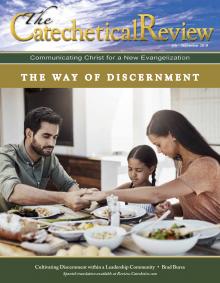Blessed Pope Paul VI boldly affirmed that, “Evangelizing is in fact the grace and vocation proper to the Church, her deepest identity. She exists in order to evangelize.”[1] If evangelization is in fact the Church’s deepest identity, it logically follows that every Catholic institution must consciously proclaim the Good News to all people and facilitate both their initial encounter and deepening relationship with the Lord Jesus. The content of this Good News is found in the kerygma, the Greek term meaning “initial proclamation.” God the Father revealed himself perfectly in the Person of his Son Jesus Christ, true God and true man, who then suffered and died to atone for all the sins of mankind, rose from the dead, and now lives forever to draw all people to the Father in himself, by the saving grace and power of the Holy Spirit. Intimate communion with the Lord Jesus is thus the Church’s primary goal. When we set out to bring this saving message to teenagers, we quickly discover no shortage of obstacles. They constitute an enormously diverse and complex demographic, particularly when it comes to their spiritual, emotional, and intellectual circumstances. They are constantly faced with challenges, some more threatening to their souls than others. Many teens today have lost or have never even possessed an awareness of the dignity, value, and eternal significance of their lives. Many of them have no appreciation for their relationship with God, who loves them into being, or have no conscious relationship with God whatsoever. Though many teens can sense this inner lack, they are oftentimes unaware that God seeks to bring healing to them. We must first help awaken in them a willingness to try a different path than the one they and their peers have been walking, and then nurture a desire in them for the guidance Christ offers. Referencing Evangelii Nuntiandi, the Congregation for the Clergy’s General Directory for Catechesis describes evangelization as, “the carrying forth of the Good News to every sector of the human race so that by its strength it may enter into the hearts of men and renew the human race.”[2] What this means is that the Gospel is intrinsically powerful and effective! We do not add any power whatsoever to the work of the Holy Spirit. What he offers through evangelization must be taken in, like a seed, in order that he may further nourish and grow his grace in the soul. Put another way, his is the true healing balm, the antidote, the cure, the elixir of eternal life. But before we can begin to decide upon a course of action for the effective offering of this healing message to our teens, we must first carefully and prayerfully consider some of the specific challenges they face in our current cultural milieu.
The rest of this online article is available for current Guild members.
This article is from The Catechetical Review (Online Edition ISSN 2379-6324) and may be copied for catechetical purposes only. It may not be reprinted in another published work without the permission of The Catechetical Review by contacting [email protected]

















